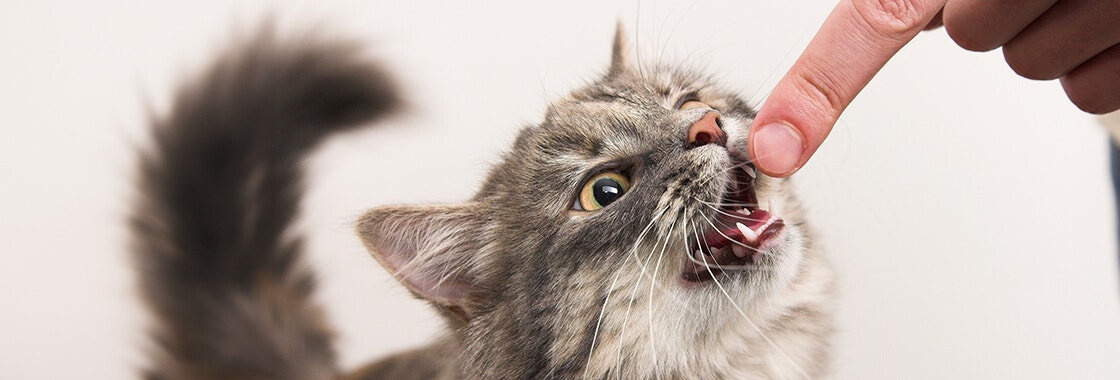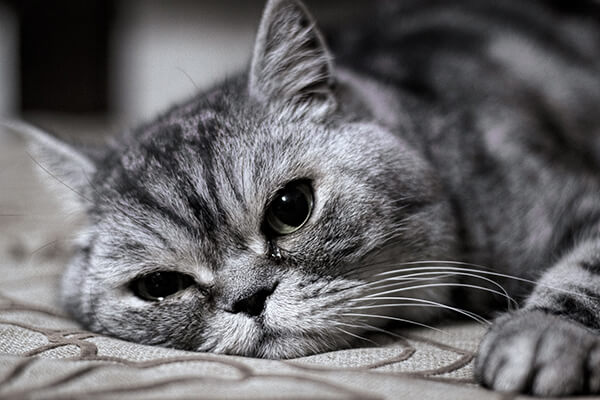- Homepage
- Blog
- Bonding & Care
- Why Do Cats Bite You
Why do cats bite you?


Share
Cats are independent creatures but most enjoy companionship and a cuddle, on their terms! However, every now and then an affectionate interaction might be interrupted by a sudden bite.
When this happens for the first time, it can be unexpected and even a little hurtful. Why do cats bite you when all you’ve done is show them affection? Cats can bite for a variety of reasons, from asking for attention and exploring their environment to showing frustration, showing you you've missed other cues to stop, or through fear or asserting dominance.
If you’ve found you’ve got a biting cat, the first thing to know is that this is perfectly natural behaviour. However, it’s still important to understand this particular form of cat communication to maintain the best bond possible with your cat.
In this guide, we’ll take a closer look at the scenarios in which cats might bite you, the reasons behind this behaviour, and how to stop a cat from biting if and when it becomes a problem.
Understanding cat biting behaviour
Cats can bite their pet parents for a range of reasons, and like other animals, cats usually use biting as a communication tool to express themselves. While a nip from an adult cat might hurt, the first thing to understand is that it’s a natural, healthy behaviour, and nothing that you have to worry about as a pet parent.
Some of the common reasons why cats might bite include as a form of play, a show of aggression, or to communicate something like a want for food or affection. Whatever the root cause behind it, a biting cat is a healthy cat. As long as it’s not consistently aggressive, biting isn’t something you need to be immediately concerned about.
Cat biting me? Reasons why
There’s no single answer to the question “why do cats bite you?” and there are a range of emotional states and stimuli that can cause this behaviour.
Here, we’ll take a closer look at some of the common reasons why a cat might bite you and the signs you can look for to understand the root of this behaviour.
Playfulness: Cats, especially when they’re young, will often bite each other when playing. Seeing as you’re part of their family, soft biting in combination with grabbing at your hand or leg with their forepaws and sometimes hindpaws is simply a way to expend their energy and enjoy some mental stimulation.
Aggression: When environmental stressors cause frustration in cats, and this is exacerbated by their pet parent not respecting their space, they can sometimes bite as an act of aggression. To avoid an aggressive biting cat, it’s important to pay attention to your cat’s body language and look for signs of hostility. These might include a stiff, straight-legged stance, constricted pupils, low, slow sounding vocalisation, and fixated staring at the source of their aggravation.
Fear-induced biting: If a cat feels scared, they’ll generally run away and hide from perceived threats. However, in situations where they feel cornered or trapped, they might react by biting or scratching as a last resort. Many cats will display warning signs that they’re feeling scared or stressed before this happens, such as flattening their ears or crouching low to the ground. Keep an eye out for these and make sure you’re not getting too affectionate with your petting.
Affection: Sometimes cats will bite as a display of affection, a behaviour that's a common part of understanding clingy cats. While this may just be because your cat is happy to be there, it can sometimes be used to let you know they want something, like food or (even more!) attention. These “loving bites'' are light and rarely break the skin, and may be accompanied by pawing or kneading. You can learn more about this in our helpful guide: Why Do Cats Paw At You.
Why does my cat bite me gently out of nowhere?
Usually, when a cat’s bite is gentle and clearly not intended to hurt, it can be taken as a sign of affection or a signifier that your cat is seeking attention or wants to play.
Provided this doesn’t hurt or become so frequent it’s aggravating, this behaviour is nothing to worry about and can be redirected easily by gently moving the cat away, or by you walking away from the cat to remove the reward of your attention. You can find out more about this kind of behaviour in our guide: How Do Cats Show Affection.
Occasionally, there are more worrisome answers to the question, “why does my cat bite me gently out of nowhere?” which might require a less passive response to minimise this behaviour.
These include:
Overstimulation: When a cat is overstimulated by factors in their environment, or their playtime’s been going a little too long, that pent-up energy can manifest in biting. You can recognise this by rapid, erratic movements and the cat generally acting “hyper” while you interact with them. This is seen quite often when cats interact with catnip.
Redirected aggression: signified by a stiff posture, constricted pupils, and flattened ears, cats can redirect their aggression towards you when there’s something about your behaviour or an unrelated stressor, anxiety or fear causing them to act aggressively.
Whatever the cause of your cat’s gentle biting, it’s important to stay patient with them, try to understand the causes, and meet it with positive reinforcement while figuring out how to stop a cat from biting.
How do I get my cat to stop biting me?
Directing your cat’s attention through positive reinforcement with treats or toys is generally effective when you’re looking at how to stop a cat from biting. Avoiding rough play and walking away from the cat will help to curb and prevent this habit.
Aside from understanding the root causes of biting, there are a few key techniques you can use to stop a cat from biting you:
Safety measures: Though cats rarely intend to hurt their pet parents, their bites can still cause injuries, particularly in young children. If you know your cat has a habit of biting, make sure to take the appropriate safety measures, such as avoiding sudden movements, or using toys to interact with them rather than your bare hands until you’ve got the biting under control.
Training techniques: When new cat owners ask “why is my cat biting me?”, one of the most common answers is simply that it hasn’t been taught not to. There are various ways to approach positive reinforcement training that can help to discourage biting in cats.
For example, if your cat interacts with you with gentle play behaviours and affection, rewarding them with treats and petting can encourage more of this in the future. If they bite you or act aggressively, then withdrawing your attention will help to discourage this.
Environmental enrichment: Often, a cat can get into the habit of biting their pet parent because they have a lot of pent-up energy and no outlet for it. In this case, enriching your cat’s environment with things like scratching posts, toys, and other things they can interact with will help prevent boredom and allow your cat to let off some steam.
Seeking professional help: Sometimes, curbing a cat’s behaviour on your own can prove especially challenging, and you may need some professional assistance. Ask a veterinarian or an animal behaviourist “why is my cat biting me?”. They can help by getting to know your cat, identifying any underlying issues that might be causing them to bite, and offering solutions that are tailored to your cat’s unique temperament.
What does it mean when your cat bites you?
A cat biting you can convey several different meanings, ranging from the simple desire to play to aggression or assertiveness. By paying attention to your cat’s body language, vocalisations, and other context, you can understand this behaviour and curb it when necessary.
Different examples of body language and vocalisations can help you understand the meaning of a cat’s bite and the best way to respond to it. For example, if a cat is purring a lot, rubbing against you, or lightly batting your hand before the bite, it’s likely playful and affectionate. If they show signs of stress or tension, such as tensing their bodies up or flicking their tails sharply, this could indicate that they’re biting you out of frustration, fear, or overstimulation.
Out of respect for your cat's personal space, if they are showing you these behavioural cues, take the hint and leave them to it. Cats like attention and affection on their terms, and to build a positive relationship with your cat, you need to respond when they are communicating their mood to you.
For more guidance on interpreting your cat’s body language, be sure to read our other guide: Why Do Cats Wag Their Tails.
Why Do Cats Bite You: Final Thoughts
Cats can bite their pet parents in response to a variety of stimuli and emotions. It’s important to understand the common causes at the root of a cat biting you, and respond in a way that controls your cat’s behaviour while still maintaining the bond with your pet and keeping them happy and healthy.
For more support on understanding your cat’s behaviour and creating a great environment for your pet, be sure to check out our other guide: Caring For A Cat.











